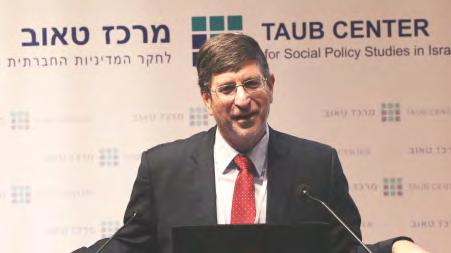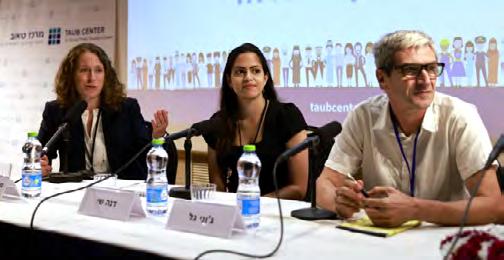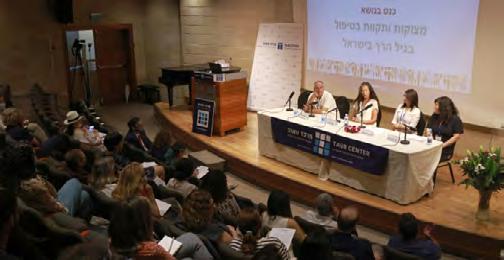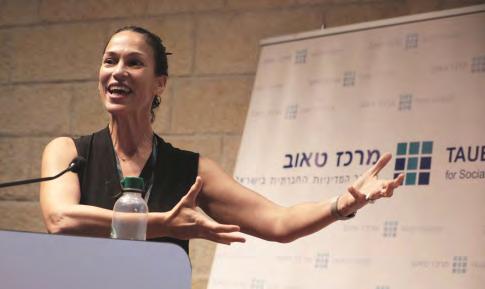
9 minute read
Section IV Impressions from the Taub Center conference on early childhood
On July 20th, the Taub Center Initiative on Early Childhood Development and Inequality held a conference entitled Dilemmas and Developments in Early Childhood Care in Israel, which was supported by the Beracha Foundation, the Bernard van Leer Foundation and Yad Hanadiv, whose generosity makes the initiative’s work possible. Participating in the conference were academics, representatives of civil society and third sector organizations, representatives of the local authorities, senior officials from government ministries and other leaders in the area of education and social welfare.
The conference dealt with a variety of topics related to early childhood and social inequality. These included poverty in infancy and its effect on the development of an infant’s brain and future academic achievement and the severe shortage of manpower in this area, which is a major obstacle to providing an optimal education to the next generation and narrowing gaps in society. Also briefly presented were local initiatives and endeavors that provide hope for advancing education and care in early childhood.
The conference opened with a welcome from Suzie Patt Benvenisti, the Director General of the Taub Center; Prof. Avi Weiss, Taub Center President; and Prof. Yossi Shavit, Principal Researcher and head of the Taub Center Initiative on Early Childhood Development and Inequality. Prof. Weiss and Prof. Shavit briefly described the main activities of the Initiative and stressed the importance of the program. Many studies have shown that inequality begins at a very early age and that environmental factors can affect an infant’s future. Therefore, it is important to understand what those factors are and to work determinedly to reduce inequality.
In the first session, entitled Early Childhood, Poverty, and Social Benefits, and the Formation of Inequality in Achievements, Dana Shay, a Taub Center researcher, presented the results of two studies that examined the relationship between poverty and success on the Meitzav exams. The findings show that children from large families who experience poverty from age 0 to 3 achieve lower scores on the Meitzav exams in Grade 5. Prof. John Gal, Principal Researcher and chair of the Taub Center Social Welfare Policy Program, provided support for these findings and presented policy alternatives to deal with poverty and its effect on early childhood. Prof. Gal also proposed creative solutions, such as differential child allowances according to age.
The second session, entitled Manpower in Early Childhood, was moderated by Prof. Yossi Shavit and was attended by Prof. Meir Yaish from Haifa University; Ms. Sima Shahino, the Director of Pedagogy in the Early Childhood Department in the Jerusalem Municipality; Ms. Fahraldin-Abu Rish, the Director of the Yanbua organizations and of the “Puzzle“ project; and Ms. Noa Tsur Brosh, a senior project manager in the area of daycare centers at the Ministry of Education. Prof. Yaish claimed that the phenomenon of the Great Resignation has not been observed in
Early Childhood in Israel: Selected Research Findings, 2022

Israel; rather there is a shift from certain types of jobs to other types. Ms. Shahino then presented data for Jerusalem and said that the shortage of manpower in the area of early childhood education is in fact primarily in the Jewish sector — both among Haredim and non-Haredi Jews — and in many cases classes are closed as a result. However, according to her there is no such shortage in Arab society, due to, among other things, the high status of jobs related to early childhood relative to other jobs.
Ms. Fahraldin provided support for Ms. Shahino’s observations on Arab society and added that despite the problems and the challenges involved in early childhood care and education, Arab women remain in the profession not only because of its social status but also because they view it as a calling. The last speaker in the session, Ms. Noa Tsur Brosh from the Ministry of Education
Impressions from the Taub Center conference on early childhood shed light on the problem from the government’s perspective, which recognizes the shortage of manpower in early childhood care, and presented the Ministry of Education’s plans for dealing with the problem.

The third session, which was entitled Voices from the Field: Programs to Advance Early Childhood Education and Care at the Local Level, was opened by the chairman of the session, Dr. Tali Yariv Mishoal, the Director of the Beracha Foundation. She emphasized that the local authorities are a key player in this domain, since they possess most of the knowledge and data on infants. She was followed by Ms. Maha Nujeidat, the Director of the Halakat (Circles) project from the Northern Goals Organization. This project, which focuses on unsupervised frameworks and is currently active in three Arab local authorities in the North, is working toward the creation of a strategic plan in education and early childhood care that will take into account the unique characteristics of each town. Ms. Helen Jacobsohn, the Director of the Early Childhood Center of the Pesher-Association for the Development of Welfare and Education Services in Lod, described the activity of the Shahar Initiative (first years of life), a municipal development unit created as part of a joint effort between the Ministry of Health, JDC-Ashalim, and the Lod local authority. The project has set itself the goal of preventing a situation in which a child is referred for developmental care but does not receive it. Ms. Yehudit Hadad, assistant to the mayor of Beit Shemesh on infrastructure and engineering, presented the Urban 95 city initiative, which operates in conjunction with the van Leer Foundation and the Council for Green Construction. The idea underlying the project is that the urban environment is not always friendly to infants and one needs to think like a toddler who is 95 centimeters tall in order to create a suitable, child-friendly environment. To this end, the project’s directors communicated with mothers in order to understand what their children need in their neighborhood. Ms. Tal Ohana, the Mayor of Yeruham, was the final speaker. She addressed the challenges facing Yeruham in education and early childhood care and some proposed solutions. In the discussion that followed, it appears that all of them agree that the local authorities potentially have the greatest effect on early childhood, but in order to realize that potential and encourage local activity there is a need for government resources.
In the final session moderated by Ms. Liora Bowers, Taub Center Chief Financial and Operating Officer and a researcher in the Initiative, Prof. Katherine Magnuson from the University of Wisconsin-Madison delivered the keynote lecture on Unconditional Cash Transfers and Family Processes: Findings from the Baby’s First Years Study. Prof. Magnuson described the project, which began in 2018 in the US, which examined the connection between poverty and brain activity related to child development. The interim findings show that children living in
Early Childhood in Israel: Selected Research Findings, 2022 poverty whose families received relatively generous economic assistance (about $4,000 per year) as part of the research were found to have enhanced brain activity with respect to attention and awareness. Meanwhile, children whose families received only a symbolic level of assistance ($240 per year) showed less brain activity of this type. The final speaker was Prof. Tzipi Horowitz-Kraus, head of the Educational Neuroimaging Group in the Faculty of Education in Science and Technology in the Technion. Her research, which focuses on the connection between environment and brain development in children, found that, among other things, the correct amount of stimulation can improve children’s language abilities.


References
English
Endeweld, M., Gottlieb, D., Heller, O., & Karady, L. (2019). Poverty and social gaps in 2018, annual report. National Insurance Institute.
Jerusalem Institute for Policy Research. Jerusalem: Facts and trends 2022, The state of the city and changing trends.
Madhala, S., Shami, L., Gal, J., & Seela, E. (2021). Enrollment of Arab children in supervised daycare. Taub Center for Social Policy Studies in Israel.
Rabinowitz, M. (2019). Early childhood education and care (ECEC) services Abstract. Knesset, Research and Information Center.
Shavit, Y., Friedman, I., Gal, J., & Vaknin, D. (2018). Emerging early childhood inequality: On the relationship between poverty, stress, sensory stimulation, and child development and achievements. Taub Center for Social Policy Studies in Israel.
Vaknin, D. (2020). Early childhood education and care in Israel compared to the OECD: Enrollment rates, employment rates of mothers, quality indices, and future achievement. Taub Center for Social Policy Studies in Israel.
Vaknin, D., Shavit, Y., & Sasson, I. (2019). Emerging early childhood inequality: Poverty and future academic achievement. Taub Center for Social Policy Studies in Israel.
Vaknin, H., & Shavit, Y. (2021). Preschool attendance through age 3 and its impact on academic achievement in Grade 4. Taub Center for Social Policy Studies Israel.
Hebrew
Bensimhon-Peleg, S., & Levi, D. (2020). Between East and West: Recommendations to narrow gaps in the child development system in East Jerusalem: A policy paper. Jerusalem Institute for Policy Research.
Doron, A. (2006). Between social exclusion and social policy: Opinion paper of the research group in social policy. Ministry of Welfare, Research, Planning and Training Department.
Fichtelberg-Barmatz, O., & Harris-Olshek, R. (2013). Mapping recognized daycare center for children and their geographic dispersion. Ministry of Economy.
Labor Division (2019). Subsidy tests for participation in tuition payment to daycare and family daycare for the 2019/2020 school year.
Ministry of Finance (2017). State revenue report 2015–2016. Ministry of Finance, Accountant General Department.
Ministry of Health (2019). Health inequalities and measures for coping with them, 2018. Ministry of Health, Financial and Strategic Planning Administration.
Northern Goals (2021). Halakat تاقلح: Initial research results for a training program for childcare workers with young children from birth to age 3 in Arab towns in Haifa and the North. Steps, Northern Goals Association.
Rosenthal, M. (January 2009). Committee report: Standards for operating educational settings for young children.
Ministry of Industry, Trade and Labor and Division of Education and Care Centers for Young Children.
Schlosser, A. (2006). Public preschool and the labor supply of Arab mothers: Evidence from a natural experiment. The Economic Quarterly, 53, 517–553.
Trajtenberg, M., Zer Aviv, H., Leyzer, R., Uziel, E. (2019). Turning the pyramid upside down. Samuel Neaman Institute for National Policy Research. Technion.
Board of Directors
Chair: Jim Angell
Dennis W. Carlton (Vice Chair, Planning and Resource Development), John Davison (Vice Chair, Budget and Finance), Miri Eisen (Vice Chair, Governance and Administration), Helen Abeles, Penny Blumenstein, John Dunn, Martha Freedman, Anat Gafni, Alan H. Gill, Ellen M. Heller, Steve Lieberman, Michael P. Lustig, Michael S. Saxon, Mark Sisisky, Caryn Wolf Wechsler, Ariel Zwang
General Assembly
Chair: Helen Abeles
Jim Angell, Penny Blumenstein, Zvi Feine, Amir Halevy, Ellen M. Heller, Steve Lieberman, Stanley Rabin, Michael S. Saxon, Mark Sisisky, Steven Taub, Caryn Wolf Wechsler, Ariel Zwang
International Advisory Council
Henry Aaron (Brookings Institution), David Autor (MIT), Mario Blejer (Banco Hipotecario), Aaron Ciechanover (Technion), Stuart Eizenstat (Covington), Han Entzinger (Erasmus University), Adam Gamoran (William T. Grant Foundation), Edward Glaeser (Harvard University), Eric Hanushek (Stanford University), James J. Heckman (University of Chicago), Peter S. Heller (Johns Hopkins University), Daniel Kahneman (Princeton University), Robert E. Litan (Korein Tillery), Burton A. Weisbrod (Northwestern University)
Center Staff
President: Avi Weiss | Director General: Nir Kaidar | Chief Financial & Operating Officer: Liora Bowers | Senior Director of Strategic Partnerships: Michal Pozmanter | Research Director: Alex Weinreb
Arielle Listokin Achdut (Grants and Donor Relations Coordinator), Rachel Arazi (Visiting Researcher), Arielle Avraham (Grants and Donor Relations Coordinator), Dudu Barazani (Maintenance), Benjamin Bental (Principal Researcher, Economics Policy Program Chair), Carmel Blank (Senior Researcher), Nachum Blass (Principal Researcher, Education Policy Program Chair), Haim Bleikh (Researcher), Nadav Davidovitch (Principal Researcher, Health Policy Program Chair), Michael Debowy (Researcher), Hedva Elmackias (Office Manager), Gil Epstein (Principal Researcher), Deena Friedman (Deputy Director of Strategic Partnerships), John Gal (Principal Researcher, Social Welfare Policy Program Chair), Rachelli
Gresser (Government Relations Coordinator), Ayelet Kamay (Publications Director), Baruch Levi (Visiting Researcher), Yuval Levy (Research Assistant), Shavit Madhala (Researcher), Chen Mashiach (Spokesperson), Lior Morag (Digital Media Associate), Yael Navon (Senior Researcher), Ori Oberman (Research Assistant), Laura Schreiber (Senior Publications Manager), Anat Sella-Koren (Director, Marketing, Communications and Government Relations), Labib Shami (Senior Researcher), Yossi Shavit (Principal Researcher and Chair, Taub Center Initiative on Early Childhood Development and Inequality), Dana Shay (Researcher), Sarit Silverman (Senior Researcher), Kyrill Shraberman (Researcher)
Past Directors: Israel Katz (z”l), Yaakov Kop (z”l), Dan Ben-David
Policy Program Fellows
Economics Policy Program
Benjamin Bental (Chair), Yarom Ariav, Adi Brender, David Brodet, Doron Cohen, Reuben Gronau, Jack Habib, Moshe Mandelbaum, Shuki Oren, Dan Peled, Assaf Razin, Haim Shani, Eytan Sheshinski, Shmuel Slavin, Avia Spivak, Michel Strawczynski, Shlomo Yitzhaki, Ben-Zion Zilberfarb
Education Policy Program
Nachum Blass (Chair), Fadia Nasser-Abu Alhija, Shlomit Amichai, Shlomo Beck, Rami Benbenishty, Carmel Blank, Inas Deeb, Yigal Douchan, Eli Eisenberg, Yariv Feniger, Isaac Friedman, Yossi Gidanian, Meir Kraus, Ariel Levy, David Maagan, Zemira Mevarech, Yael Navon, Joel Rapp, Rita Sever, Yossi Shavit, Edna Shimoni, Rami Sulimani, Eran Tamir, Yuli Tamir, Yuval Vurgan, Zvi Yanai, Noam Zussman
Health Policy Program
Nadav Davidovitch (Chair), Dorit Adler, Anat Arbel-Shamir, Alexander Aviram, Uri Aviram, Ran Balicer, Shlomo Barnoon, Yitzhak Berlowitz, Nakhle Bishara, Bishara Bisharat, Orna Blondheim, Adi Brender, Shay Brill, David Chinitz, Tal Dovev, Asher Elhayany, Miri Endblad, Leon Epstein, Ronni Gamzu, Yigal Ginat, Dan Greenberg, Eitan Hai-Am, Jonathan Halevy, Eran Halperin, Avi Israeli, Orit Jacobson, Avigdor Kaplan, Rachel Kaye, Maya Leventer-Roberts, Jacob Menczel, Shlomo Mor-Yosef, Roei Ben Moshe, Adi Niv-Yagoda, Meir Oren, Baruch Ovadia, Eran Politzer, Sigal Regev-Rosenberg, Amir Shmueli, Haim Silber, Varda Soskolne, Jochanan Stessman, Aviad Tur-Sinai, Dan Zeltzer
Labor Policy Program
Einav Aharoni-Yonas, Rani Dudai, Gil Epstein, Haggay Etkes, Mark Feldman, Daniel Gottlieb, Nitsa (Kaliner) Kasir, Yaakov Loupo, Miki Malul, Guy Mundlak, Dalia Narkiss, Tali Regev, Dmitri Romanov, Moshe Semyonov, Ofer Setty, Sigal Shelach, Arie Syvan, Yossi Tamir, Aviad Tur-Sinai
Welfare Policy Program
John Gal (Chair), Michal Almog-Bar, Ofer Arian, Uri Aviram, Avishai Benish, Orly Benjamin, Nissim Cohen, Abraham Doron, Israel Doron, Rani
Dudai, Zvi Feine, Boni Goldberg, Daniel Gottlieb, Anat Herbst-Debby, Roni Holler, Nitsa (Kaliner) Kasir, Chana Katz, Michal Koreh, Michal KrumerNevo, Lihi Lahat, David Levi-Faur, Ibrahim Mahajne, Miki Malul, Ronen Mandelkern, Menachem Monnickendam, Baruch Ovadiah, Nadav PerezVaisvidovsky, Yekutiel Saba, Talia Meital Schwartz-Tayri, Shmulik Sheintuch, Sigal Shelach, Roni Strier, Yossi Tamir, Aviad Tur-Sinai, Idit Weiss-Gal, Uri Yanay, Amos Zehavi


